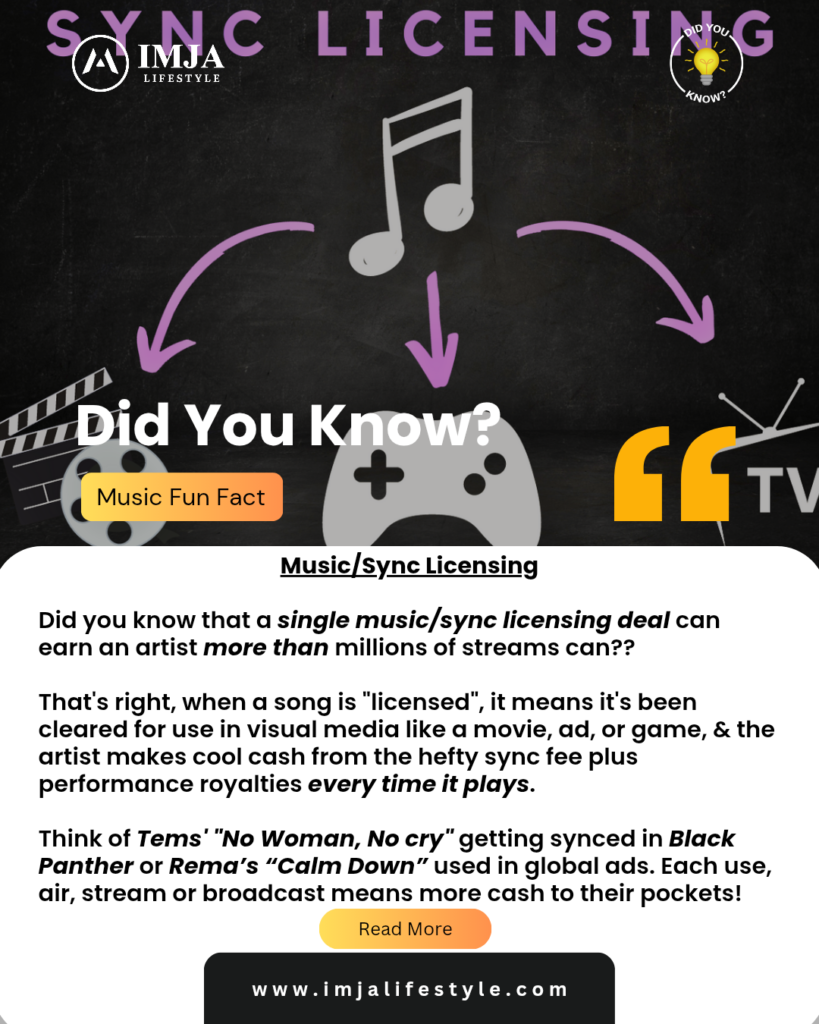Most people think streaming is where artists make their money, but the real fortune actually lies behind the scenes of music licensing and sync deals.
What Is Music Licensing?
Music licensing, otherwise known as sync licensing is when an artist gives permission for their song to be used in visual media like films, ads, video games, and TV shows.Every time a song is synced to a visual, the artist earns a sync fee plus performance royalties.In short, music licensing is how your favorite songs end up in movie trailers, Netflix series, and TikTok ads, hereby making the artist rich in the process.
The Significance
To put it in perspective, it takes roughly 250 Spotify streams to earn $1. Meanwhile, a single sync deal can bring in $5,000–$500,000 (sometimes even more).
This is why top artists, ranging from Hollywood legends to Afrobeats stars are beginning to chase sync placements like never before.
This is evident in the context of Afrobeats artists like:
• Tems – “No Woman, No Cry” (Black Panther: Wakanda Forever)Her emotional delivery on the song helped define the movie’s tone hereby landing her massive licensing payout plus global attention.
• Rema – “Calm Down”Beyond being a hit, Calm Down has been licensed for international ads and campaigns. This means more money for the young Afrobeats talent.
• Burna Boy – “Destiny”Featured on Barack Obama’s playlist and multiple documentaries, showing how African music is being woven into global storytelling, Burna Boy is making making money off that track due to sync deals.
How It Works
• Music Supervisors Search for a Track: A film or brand looks for the perfect sound.
• License Negotiation: The artist, label, or publisher agrees to terms and usage.
• Payment: The artist receives an upfront sync fee, and continues to earn royalties whenever the song airs.
• Split Between Rights Holders: Both the writer/publisher and the recording owner (often the label) get paid.
That’s why owning your masters is such a big deal, it means you control your licensing income.
Key Takeaways for Artists
• Register with a Performance Rights Organization (PRO) like ASCAP, BMI, PRS, or COSON.
• Add your songs to sync libraries like Artlist, Musicbed, or Epidemic Sound.
• Keep an instrumental version of each track ready — many syncs prefer vocals light or clean.
• Build relationships with music supervisors; they’re the gatekeepers to placements.
The drill is, music licensing isn’t just about exposure, it’s a career game-changer.
From Lagos to Los Angeles, artists are realizing that one song in the right film or ad can make more than a million streams ever will.
In today’s music economy, as an artist, your next big break might not be a hit single, it might just be a sync deal.
Written by Alaro Basit

